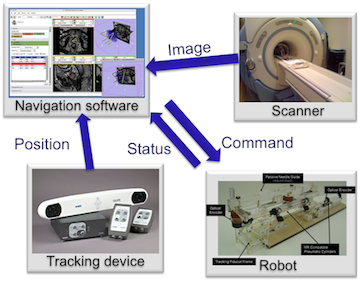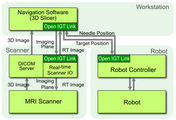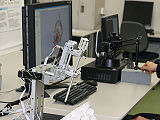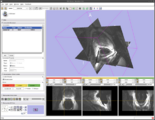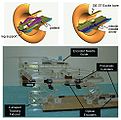Difference between revisions of "OpenIGTLink"
| Line 1: | Line 1: | ||
The goal of OpenIGTLink is to provide a standardized mechanism to connect software/hardware through the network for image-guided therapy (IGT) applications. The features of OpenIGTLink include: | The goal of OpenIGTLink is to provide a standardized mechanism to connect software/hardware through the network for image-guided therapy (IGT) applications. The features of OpenIGTLink include: | ||
| − | *'''Open.''' OpenIGTLink | + | *'''Open.''' OpenIGTLink specifications are open and can be used for any applications, including commercial products, free of charge. |
| − | *'''Simple.''' Developers can easily adapt their own software/hardware to OpenIGTLink | + | *'''Simple.''' Developers can easily adapt their own software/hardware to OpenIGTLink specifications. |
| − | *'''Platform independent.''' OpenIGTLink supports wide range of | + | *'''Platform independent.''' OpenIGTLink supports wide range of devices from embedded system to high performance computers. |
*'''Ready-to-use.''' OpenIGTLink is supported in NA-MIC's medical image processing and visualization platform [http://slicer.org/ 3D Slicer]. | *'''Ready-to-use.''' OpenIGTLink is supported in NA-MIC's medical image processing and visualization platform [http://slicer.org/ 3D Slicer]. | ||
| Line 21: | Line 21: | ||
* [[OpenIGTLink/Protocol | Standard Protocol]] | * [[OpenIGTLink/Protocol | Standard Protocol]] | ||
| − | ===Version 2 ( | + | ===Version 2 (under development)=== |
* This is a version which is still in development. .... | * This is a version which is still in development. .... | ||
| − | * It is expected that this version will | + | * It is expected that this version will be released in early 2011 |
* [[OpenIGTLink/ProtocolV2/Plan| Release plan for version 2 protocol]] | * [[OpenIGTLink/ProtocolV2/Plan| Release plan for version 2 protocol]] | ||
* [[OpenIGTLink/ProtocolV2/Summary| Version 2 Summary -- What's new in V.2?]] | * [[OpenIGTLink/ProtocolV2/Summary| Version 2 Summary -- What's new in V.2?]] | ||
Revision as of 16:24, 9 December 2010
Home < OpenIGTLinkThe goal of OpenIGTLink is to provide a standardized mechanism to connect software/hardware through the network for image-guided therapy (IGT) applications. The features of OpenIGTLink include:
- Open. OpenIGTLink specifications are open and can be used for any applications, including commercial products, free of charge.
- Simple. Developers can easily adapt their own software/hardware to OpenIGTLink specifications.
- Platform independent. OpenIGTLink supports wide range of devices from embedded system to high performance computers.
- Ready-to-use. OpenIGTLink is supported in NA-MIC's medical image processing and visualization platform 3D Slicer.
Protocol
The OpenIGTLink protocol was originally developed in 2008. Currently, the extended protocol is being drafted and will be released as protocol version 2 early 2011. The OpenIGTLink protocol is backward compatible, in the sense that all messages generated by software with OpenIGTLink version 1 interfaces can be imported by software with version 2 interfaces.
OpenIGTlink: Version 1
- This is the stable version of OpenIGTlink. It is recommended that you use this version, unless you are part of the development team.
- Standard Protocol
Version 2 (under development)
- This is a version which is still in development. ....
- It is expected that this version will be released in early 2011
- Release plan for version 2 protocol
- Version 2 Summary -- What's new in V.2?
- Version 2 Draft Page
- Version 2 Trial
Extended Protocols
Software/Hardware
Reference Library
- C/C++
- Matlab / Octave (under development)
Interfaces / Software
Hardware
Please see the list of hardware that supports the OpenIGTLink Protocol.
Tutorials/Events
- Tutorial Materials
- Tutorials on image-guided therapy (IGT) using Slicer 3 and OpenIGTLink are available at IGT:ToolKit
- Tutorial on 3D Slicer and Tracker simulator in 3D Slicer OpenIGTLink IF Documentation page.
- Meetings / Workshops
References
- Publications
- Tokuda J, Fischer GS, Papademetris X, Yaniv Z, Ibáñez L, Cheng P, Liu H, Blevins J, Arata J, Golby AJ, Kapur T, Pieper S, Burdette EC, Fichtinger G, Tempany CM, Hata N. OpenIGTLink: an open network protocol for image-guided therapy environment. Int J Med Robot. 2009 Dec;5(4):423-34.
- Related web pages
- Slicer 3 Image-Guided Therapy (IGT) suite
- Slicer 3 Daemon Another network interface in 3D Slicer
- OpenDMTP - Open Device Monitoring and Tracking Protocol
- Uniform Driver Interface (UDI)
- Debian Source Package: OpenIGTLink
Support
License
New BSD license ©2008 Insight Software Consortium
Mailing List / Contact
We are launching the OpenIGTLink mailing list (openigtlink@bwh.harvard.edu). If you would like to join, please subscribe from OpenIGTLink ML Info Page or send Junichi Tokuda (tokuda at bwh.harvard.edu) a message with:
- Your name
- e-mail address you would like to use to post and receive ML articles on
- Affiliation
- Your research topic
Acknowledgements
- Contributors
- Luis Ibáñez, Ph.D., Kitware
- Junichi Tokuda, Ph.D., BWH
- Csaba Csoma, JHU
- Jack Blevins, Acousticmed
- Patrick Cheng, Ph.D., Georgetown University
- Haying Liu, BWH
- Kiyoyuki Chinzei, Ph.D., AIST, Japan
- Jumpei Arata, Ph.D., Nagoya Institute of Technology, Japan
- Steve Pieper, Ph.D., Isomics, Inc.
- Yuichiro Hayashi, Ph.D., Nagoya University
- Atsushi Yamada, Ph.D., Nagoya Institute of Technology
- Insight Software Consortium
- Funding Support
- Enabling Technologies for MRI-Guided Prostate Interventions funded by NIH (PI: Clare Tempany, MD)
- National Center for Image-Guided Therapy (NCIGT)
- National Alliance for Medical Image Computing (NA-MIC)
- Intelligent Surgical Instrument Project sponsored by The Ministry of International Trade and Industry, Japan
